Shang-Dong Wolf Traps in Ladakh
GHE Jan 29, 2026
Skilling Health Workers on Medical Instrumentation and Maintenance
Empowering the Future
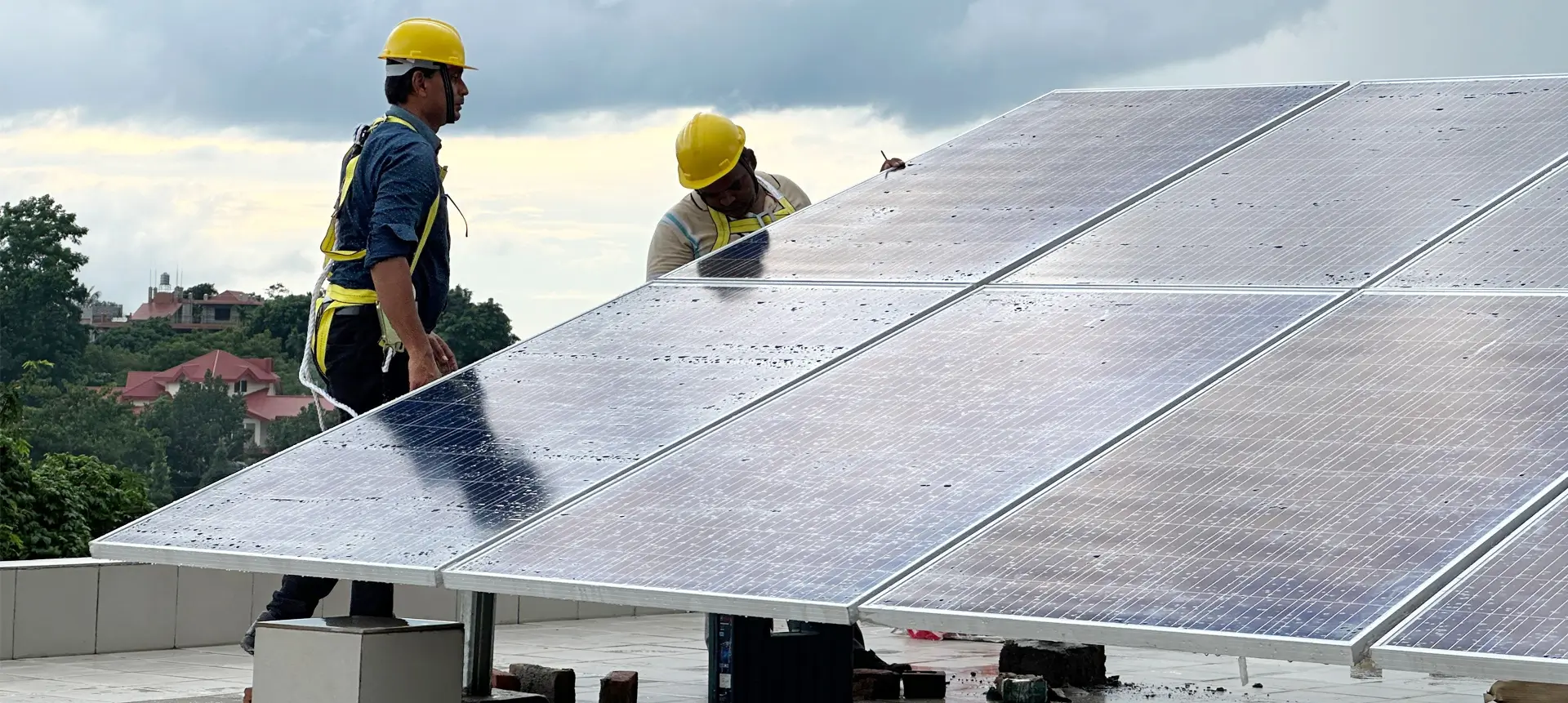
India is facing a significant unemployment crisis, exacerbated by the global pandemic, which has highlighted the growing gap between the skills of the youth and the evolving demands of emerging industries. This issue is particularly acute in the Himalayan and Northeastern states, where limited opportunities and traditional skilling courses have forced many young people to migrate in search of employment, worsening the skill gap.
In these regions, the challenges are unique: there are fewer avenues for skill development, and the industries present do not align well with traditional vocational courses. Addressing this skill gap requires tailored initiatives that consider local contexts, promote sustainable employment within the region, and preserve indigenous skills.
Green Skilling: An Untapped Opportunity
India’s youth, making up over 65% of the population under 35, has the potential to transform the nation into a global powerhouse and skill capital. However, a significant skills gap remains, with companies reporting a 60% deficit in contemporary skills. The National Education Policy, 2020, aims to address this by shifting the education system towards fostering adaptability and critical thinking.
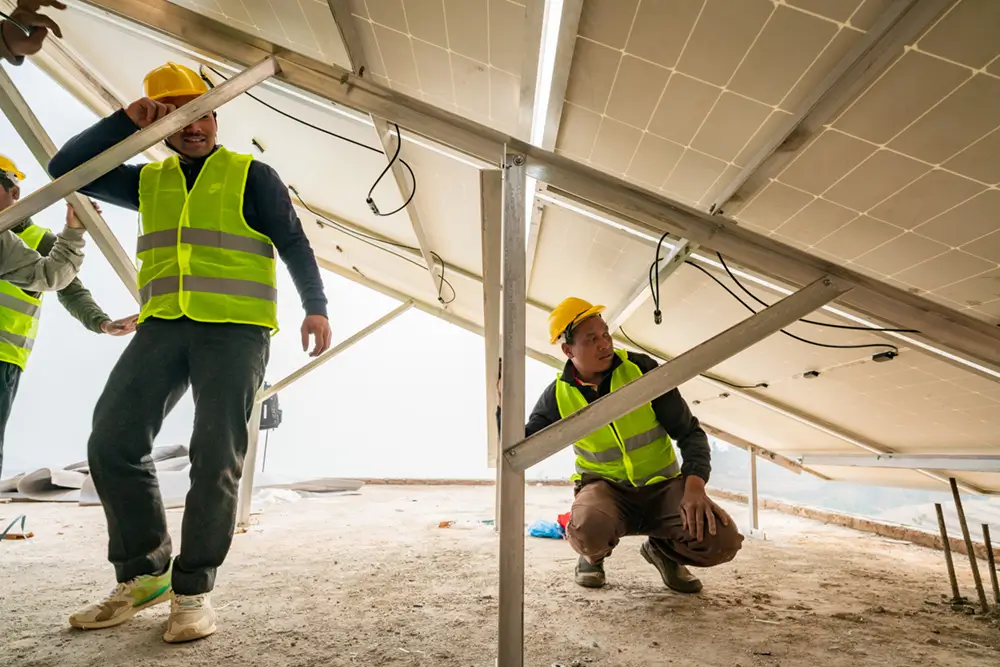
GHE Engineers setting up Solar Roof top plant in Nepal
India could create around 3.4 million jobs by 2030 in Clean Energy
The Government of India’s push towards solar power—encouraging solar power plants for domestic, industrial, and large infrastructure projects—has created a massive demand for solar technicians and engineers. A recent report suggests that India could create around 3.4 million jobs by 2030 by installing 238 GW of solar and 101 GW of wind capacity. These jobs are particularly relevant in the wind and on-grid solar energy sectors, representing a significant opportunity for green skilling.
Our Objective
At GHE, our goal is to equip the youth with relevant, future-oriented skills in solar technology, aligning with sustainable practices and meeting the demands of evolving industries and local needs. For the past decade, our dedicated team of engineers and technical experts has implemented solar-based interventions across 1600 villages in challenging terrains like Ladakh, Arunachal Pradesh, Nagaland, Meghalaya, Odisha, and Nepal.
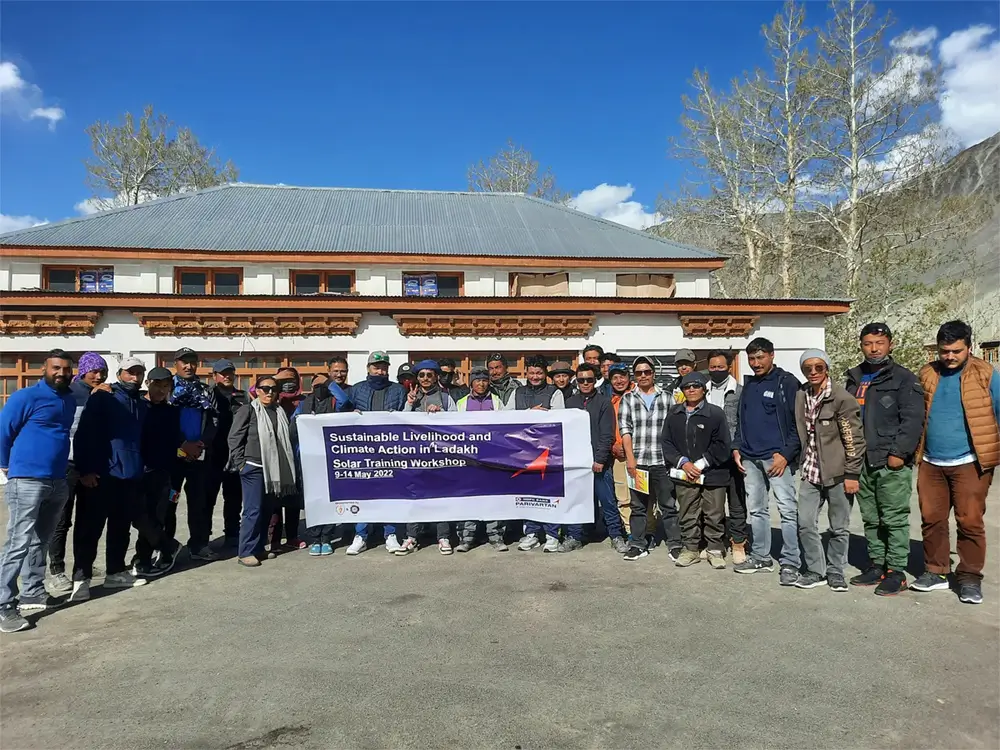
GHE trained 36 youth in Solar Technical skills in Ladakh
What sets us apart is our commitment to understanding local issues and needs, allowing us to design solutions that go beyond conventional methods. Our holistic approach combines technical expertise with a genuine connection to the communities we serve, focusing on empowering local youth and building their capacities to support dignified lives in their own regions. This comprehensive commitment to sustainable development is rooted in understanding, adaptation, and empowerment.
“By empowering the next generation of solar technicians and engineers, we can drive both economic growth and environmental sustainability, creating a lasting impact on the communities we serve”
– Conrad Sangma, Chief Minister – Meghalaya State, India
Local youth gains hands on experience in setting Up Solar Plants
Training Process
Our training process is designed to be comprehensive, ensuring that participants gain both theoretical knowledge and practical skills. The process includes:
- Coordination and collaboration with district authorities and village councils.
- Mobilization of youth and need-based selection for training.
- A five-day comprehensive training program followed by two days of on-field training.
- Theory and practical assessments, with certification and service tool kits provided to participants.
- Setting up Solar Service Centers for selected youth entrepreneurs.
- Career guidance camps and placement assistance.
- Ongoing monitoring of trainees’ career paths.
Training Module
The training module covers essential topics in solar technology and electrical engineering, including:
- Day 1: Introduction to Electrical Engineering, focusing on the basics of electricity, AC and DC currents, and the use of tools and equipment for electricians.
- Day 2: AC Grid Wiring and Energy Loading, teaching participants how to install inverters and other electrical equipment.
- Day 3: Solar Plant Setup, covering the types of solar plants, DC Current Wiring, and system wiring.
- Day 4: Practical Setup, where participants set up a solar grid and learn troubleshooting and maintenance techniques.
- Day 5: Test and Certification, with a practical test and a certificate distribution ceremony.
- Day 6: Field Training, where participants gain real-world experience by working on actual projects with GHE’s team.
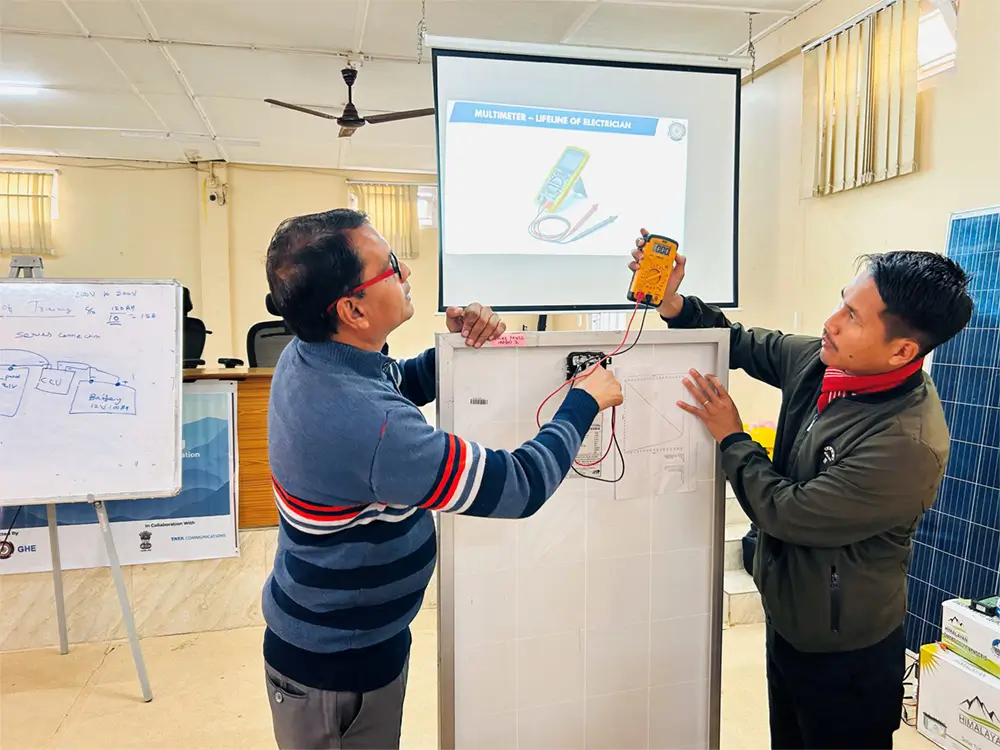
Tailored made Solar technician Training for Village Youth
Regular training enhances healthcare delivery quality
by 30%
Field Training and Tools
Field training provides participants with exposure to real-life applications, ensuring they gain hands-on experience in setting up solar plants. Participants are also equipped with personal toolkits and information booklets, enabling them to tackle issues in AC or DC systems and regular electrical problems in their communities.
Key Outcomes
The key outcomes of our program include:
- Technical Competence: Participants gain the ability to interpret technical parameters for solar energy systems.
- Professional Opportunities: Training opens up opportunities for participants to work as Solar Technicians.
- Entrepreneurial Prospects: Participants may pursue entrepreneurial ventures within the solar energy sector.
- Repair and Maintenance Skills: Participants become proficient in identifying and rectifying faults in circuits and equipment.
- Local Business Creation: The program stimulates economic growth and generates employment within marginalized communities.
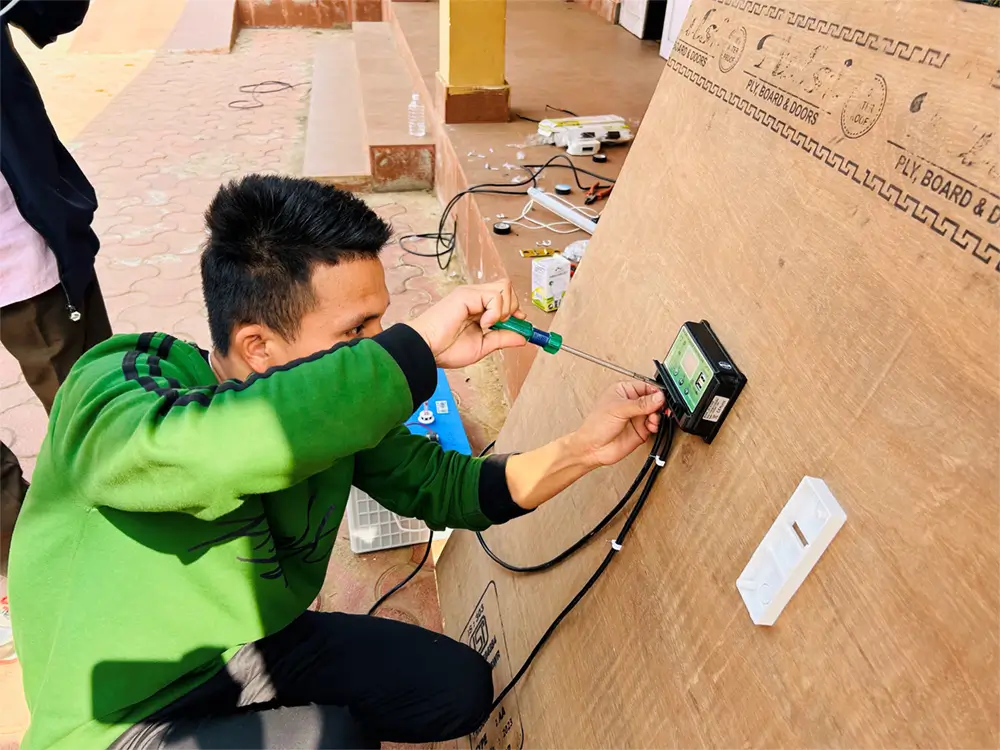
Hands on Practical Training with Solar
Advocacy and Awareness
We engage local communities to raise awareness about the benefits of solar energy and the opportunities created by the program. We also collaborate with state government departments, NRLM, and NGOs to promote the program and advocate for policy support. Our public awareness campaigns emphasize the importance of renewable energy adoption and the role of skilled technicians in driving this change.
Sustainability
The program’s emphasis on clean energy aligns with long-term environmental sustainability, while the skilling component equips youth with sought-after skills in the rapidly evolving solar sector. By supporting India’s net-zero goal, we aim to activate solar missions in rural and remote areas, addressing the demand for skilled manpower without forcing local youth to migrate.
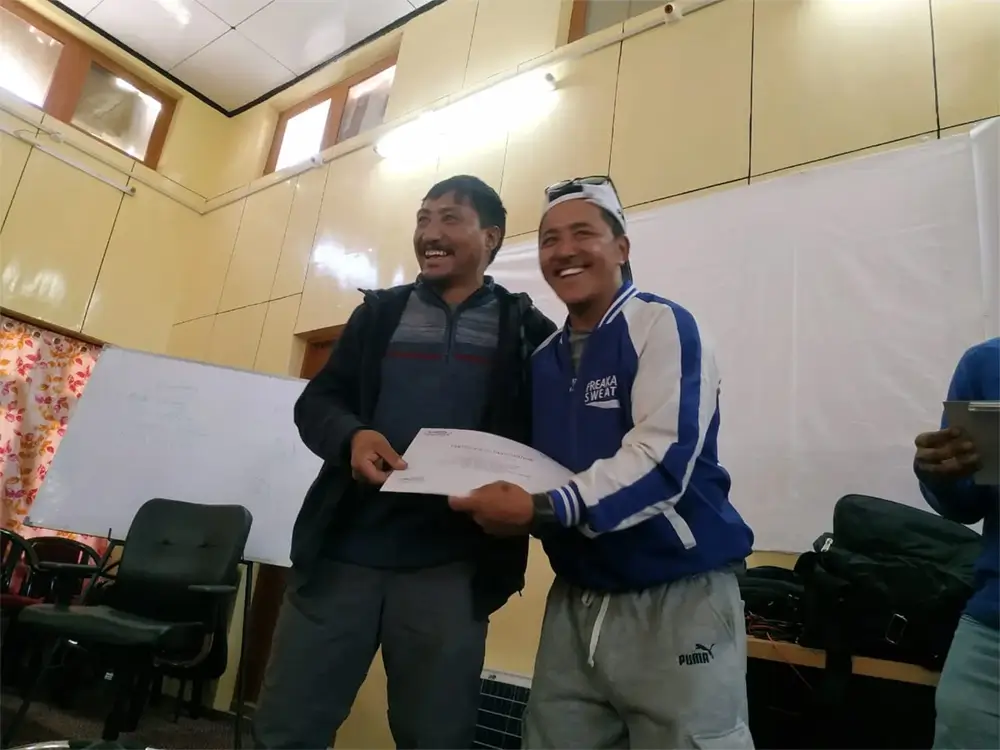
The joy of after receiving the Solar Technician Certificate
Impact and Potential
The “Green Skilling of Youth” program offers a sustainable solution to multiple challenges, aligning with both state and national priorities for renewable energy and youth employment. By empowering the next generation of solar technicians and engineers, we can drive both economic growth and environmental sustainability, creating a lasting impact on the communities we serve.
Latest Blogs
Explore perspectives on the work we do and ways to make an even greater impact together.






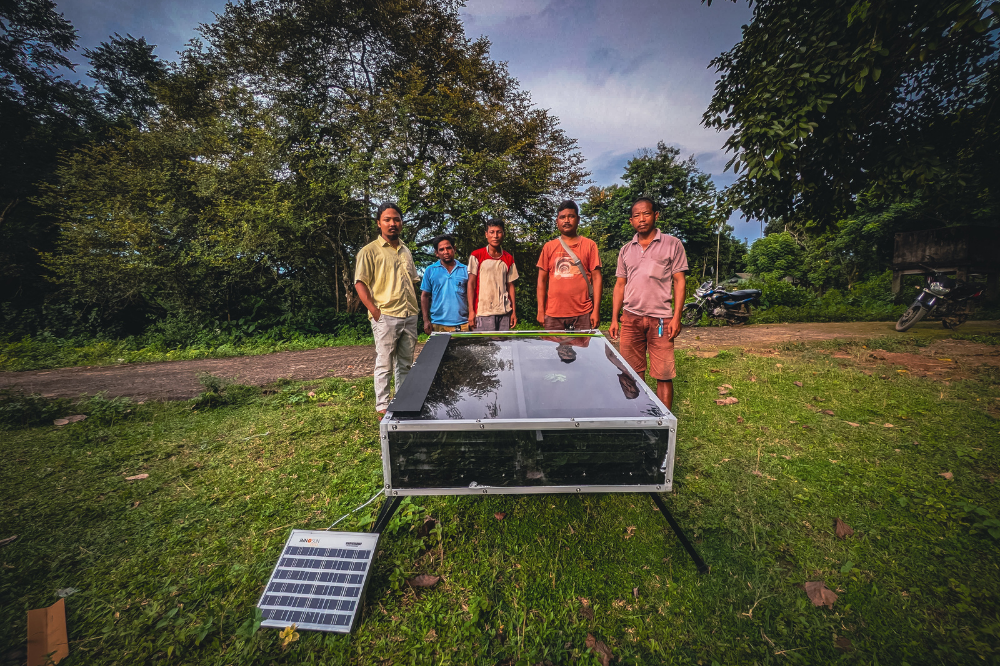



0 Comments